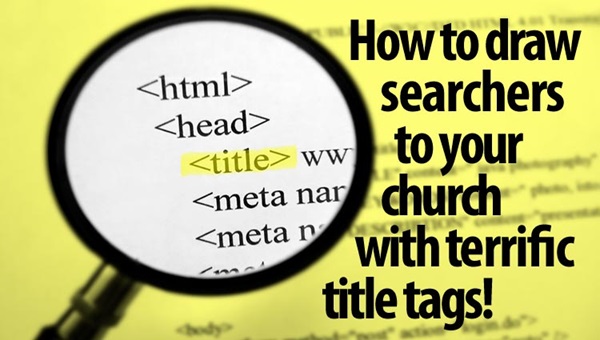If you want people to find your church website, one of the most important search engine optimization (SEO) steps is coming up with good title tags. If you do a search on Google, the results will show your search term within the title tag for each page. Subsequently, you must research the exact keywords or phrases that people commonly use and create titles accordingly.
Here are some tips on crafting terrific page titles that draw searchers to your church.
1. Know the optimum character length
Based on Google's 2014 search results redesign, the optimum length of a title tag is between 55 and 60 characters. If you want to get technical, the title will get cut off at 512 pixels. Some experts say that you can go a little longer because search engines use every word for indexing purposes. However, if you go long, make sure the most important keywords and phrases do not get cut off. The Moz Blog provides a great title tag preview tool you can use to test for optimum length.
2. Be concise, but not short
A short title tag can prevent good indexing. A page titled “Sunday” tells a searcher (or the search engines) too little. “Sunday Worship Times in Town Name” tells the search engines and a person searching exactly what they can find. Being concise, but not short, will result in more clicks.
3. Let Google do the work for you
If you are not sure how to craft your title, then do a generic search that is associated with the content on your page. Next look at the keywords and phrases used in the titles from that search and create your own derivative. Google has already deemed these titles worthy, so it's always a good idea to do this research first.
4. Use popular keywords and phrases
A searcher will see a list of all the indexed sites, but only sites with the exact search phrase will be highlighted in bold. Correctly matching your title with the exact phrase that people use in their search will garner great click-through rates. That said, be careful not to force certain keywords or phrases into your page titles or they may look out of place. Try to strike a balance between what sounds natural and what you find from reseach.
5. Create unique titles
What is unique about your content? In most cases, you want people nearby to find you, so including your location is crucial. If the content is niche-specific, include relevant keywords that people in those circles use. A unique title will help pique the interests of searchers and refine search results.
6. Do not reuse
If you have a new page on your website, make sure to set it apart from the rest of the site. If you are using the same title on every page (blog, home, UMC, etc.), search engines will push your site down the list of indexed sites. Take the time to change the titles on each page.
7. Insert your brand
Consider inserting your brand, the church name, at the end of your titles. This can prove helpful if you have a township name within your church name or you want to show that you are a “United Methodist Church.” Since the optimum character length for titles is between 55 and 60 characters, you may abbreviate and use “UMC” instead. Keep in mind that this tip is optional and you do not need to get stuck trying to fit the church’s name into the title of every page.
BONUS: Instead of using “click here,” use the exact title of the page you are linking to. Practice this tip now. Check out our church web page examples optimized for search engines. It's easy!
Your church has much to offer. Optimize each page on your website, so it can be found. Follow these tips and you are sure to see an increase in search traffic to your website and, ultimately, visitors through the church doors.

